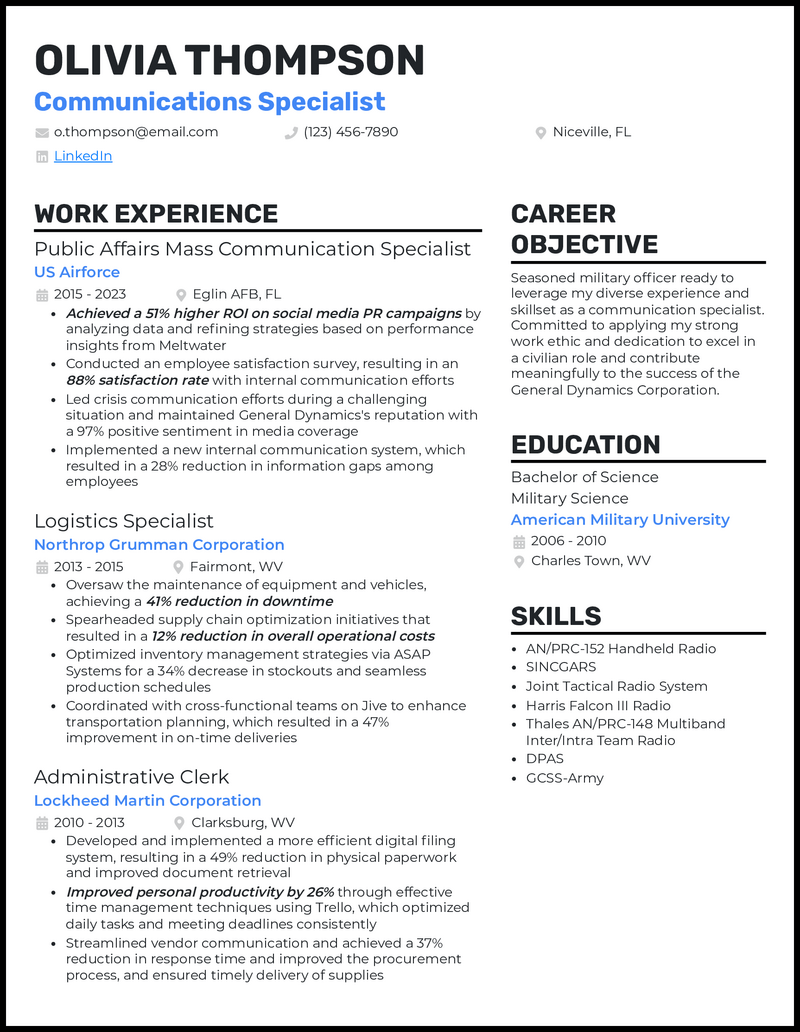Transitioning from a role in the military to a civilian job can feel challenging, but it’s a great opportunity to leverage your unique skill set. Not many people have the kind of experience and ability to work under pressure that you do—employers will value that if you present the information the right way.
Your ability to adapt and convey critical information makes you a valuable candidate in any civilian setting. From managing radio frequencies to leading strategic communications, you possess a diverse skill set. You just need to put it down on paper!
Luckily, our resume and cover letter writing guides have helped many military personnel excel in the job market. Check out our military-to-civilian resume examples and land the job you want.
Related resume examples
What Matters Most: Your Experience & Transferable Skills

Your transition from military personnel to a civilian role is an opportunity to showcase a unique set of skills that can benefit any company. For technical roles, delve into the nitty-gritty of your expertise. The exact scope will depend on what your role in the military was.
For instance, as a military communications specialist, highlight software proficiency, familiarity with military-grade communication systems, or any specialized training in data analysis. You can also highlight your ability to perform under stressful conditions and strict time restraints.
Don’t shy away from detailing your grasp on project management, leadership, and adaptability—soft skills that transcend roles. Whether decoding encrypted messages or managing teams, emphasize the transferable skills that are crucial to most jobs.
9 best military to civilian skills
- Data Analysis
- Asana
- Project Management
- Microsoft Office
- Hootsuite
- Social Media
- Google Workspace
- Meltwater
- Quality Assurance
Sample military to civilian work experience bullet points
In the military, your resume is a narrative of your achievements—a compelling story of impact and success. That’s exactly what recruiters want to see. Focus on outcomes that show your impact more than just your day-to-day work.
Highlight achievements like getting a higher ROI on social media PR campaigns or successfully leading a team. It all depends on the job you’re applying to. Add some data to showcase not just what you did but exactly how successful you were.
Make sure to emphasize how the job skills and work experiences you amassed during your service transfer into civilian roles so the hiring manager knows why they should pick you over someone else.
Here are a few examples:
- Executed employee satisfaction surveys, driving improvements that led to a 19% increase in overall satisfaction with internal communication efforts
- Elevated social media presence by implementing targeted PR strategies, resulting in a 43% increase in engagement and a 27% growth in online followership
- Spearheaded supply chain optimization initiatives that resulted in a 12% reduction in overall operational costs
- Coordinated with cross-functional teams on Jive to enhance transportation planning, which resulted in a 47% improvement in on-time deliveries
Top 5 Tips for Your Military to Civilian Resume
- Highlight leadership and adaptability
- Showcase the leadership skills you gained in the military, emphasizing flexibility and resilience. This shows recruiters your capacity to thrive in high-pressure environments, which is necessary in many jobs.
- Quantify achievements with metrics
- Some thoughtfully picked-out data always makes your accomplishments pop. Whether it’s improving communication efficiency or increasing the efficiency of warehouse operations, don’t be afraid to quantify your past achievements.
- Translate military projects into civilian language
- When discussing military projects, break down the technical jargon and translate it into language understandable to civilians. Focus on the outcomes and skills you acquired so that your projects resonate with employers outside of a military setting.
- Emphasize transferable skills
- In your hobbies and interests section, emphasize activities that are relevant to the job you’re seeking. Whether it’s leading a team in a sports league or organizing events, highlight work experience that shows you’ve got plenty of useful skills.
- Get ahead of the game
- Recruiters often use applicant tracking systems (ATS) to scan resumes, but you can beat them at their own game if you tailor your application to each job. Use civilian-friendly terminology, add relevant keywords, and format your resume for easy readability.
It’s totally up to you, but a tailored resume objective can be impactful. Specify the job and company, emphasizing the adaptability and leadership skills you gained in the military. Highlight your enthusiasm for transitioning into civilian work and learning new skills.
Identify transferable skills by reviewing the job description and aligning them with your military experiences. For instance, if you’re applying to work as an administrative assistant, highlight your background in reporting.
Absolutely. Include relevant military certifications, such as leadership training or specialized technical qualifications. Translate them into civilian terms if you need to.








